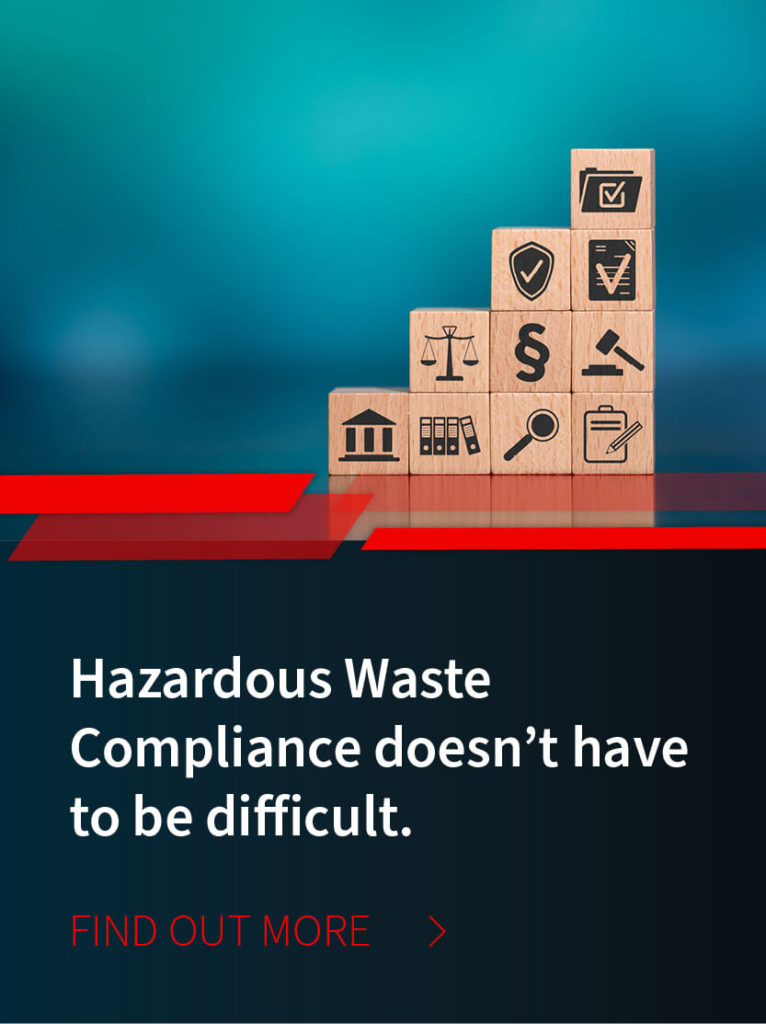
/ IN THIS BLOG
01 / What is a Hazardous Waste Contingency Plan?
A hazardous waste contingency plan is a written plan of actions to be taken in the event of an emergency. Such plans are required by local, state, and federal governmental agencies to protect people, structures, and the environment in the event of a spill, an explosion, a fire, or any number of issues that may affect the safety of employees in their place of business.
Such a plan consists of a written document detailing the specifics of that program. Some of the things that are commonly found in a contingency plan include information as to who is in charge of coordinating emergency personnel, evacuation routes, and preparedness and prevention training, just to name a few.
A hazardous waste contingency plan specifies actions that must occur in the event of an accident involving hazardous materials you generate within your manufacturing or industrial business. Such a plan is also recommended for any structure or facility that utilizes any hazardous substances or materials. Such accidents can range from fires and explosions to the unexpected release of a hazardous material during transport.
The contingency plan provides guidance and instructions that supervisors or employees can take in such an emergency, and what should and shouldn't be done in such cases. Its purpose is obviously the health and safety of everyone and everything at your facility and in the area directly affected by the hazardous waste–related emergency.
02 / Who Needs to Develop a Contingency Plan?
While it is highly recommended that any company or business that uses hazardous products or components or produces such waste have a hazardous waste contingency plan in place, a very small quantity generator (one who produces less than 100 kg of hazardous waste per month or 1 kg or less of acute hazardous waste per month) is not required to have emergency procedures or a contingency plan in place, per the Code of Federal Regulations (CFR) Title 40, Part 262. However, state laws must be followed, and many states do require such plans to be in place, so check with your state’s regulatory agencies for more information.
A small quantity hazardous waste generator is required to have basic planning protocols in place, per Title 40 CFR Section 262.16 (b)(9)(iii). A large quantity hazardous waste generator is required to have a full plan in place (per Title 40 Part 262 subpart M – from Section 262.17(a)(6)).
For safety, everyone who generates hazardous waste should have this program and written documentation in place. Different requirements are based on waste generator status, but even small quantity generators should also have a plan in place, even if somewhat less exhaustive.
03 / Basics of a Hazardous Waste Contingency Plan
A contingency plan may differ slightly in scope and nature based on the size of the business and its hazardous waste generator status classification. However, most plans will have similar components. Check with your state’s Department of Natural Resources for details or visit your state government’s webpage for information.
Whether you're a small quantity generator or a large quantity generator, adhere to the following guidelines:
Assign one or more people to be the emergency coordinator/s. Include contact information for this person (or people) within the plan.
Include the location of emergency response equipment or tools and emergency telephones.
Ensure all employees know this plan exists and are familiar with the procedures. (Obviously, an emergency situation is never planned or expected and can arise at any moment. Therefore, all employees need to be prepared and equipped to respond quickly and accurately to minimize safety hazards.)
A large quantity generator must adhere to additional requirements to maintain compliance:
The contact information for your emergency coordinator must be detailed and explicitly stated. This includes name, address, and phone number for the person (home and office).
The plan must be written on-site, and it must be reviewed and updated frequently.
The Resource Conservation and Recovery Act (RCRA) stipulates that a hazardous waste contingency plan must contain specific items. Refer to 40 CFR 265.51 for details. Items found in many contingency plans also include but are not limited to:
What actions personnel might take to minimize hazards
The emergency coordinator should also have immediate access to local and state first responders
A description and location of where all emergency response equipment as well as physical descriptions of such items as well as clean-up equipment (and its capabilities and/or limitations). Be aware that the plan must also ensure that such equipment is regularly tested and maintained (see 40 CFR 265.33).
Once the contingency plan is completed, know who gets a copy.
04 / Who needs a Copy of a Hazardous Waste Contingency Plan?
No matter the size your company or its generator status, if there's the potential for a dangerous event with your hazardous materials, you should submit a copy of your plan to your local authorities. This includes the nearest fire station, police station, hospital, and other emergency responders. Copies, of course, must also be kept at your facility.
If your plan calls for you to provide your own responders, copies must still be sent to the proper authorities. If something were to happen off-site during hazardous waste transport, your local authorities will need to know the proper protocol for clean-up and whom to contact first.
05 / How Can a Hazardous Waste Management Company Help?
When dealing with a hazardous waste accident or other unexpected event, it can quite honestly be a matter of life and death. An emergency contingency plan is a vital piece of ensuring you do everything in your power to keep your employees, the public, and the environment safe.
If you're at all unsure of what needs to go in this plan, how to go about creating one, or if you are unsure if your current plan meets the regulatory requirements, reach out to an experienced waste management company such as MCF Environmental Services to make sure you’re compliant.
For more information about contingency plans and what role they play in creating, storing, and transporting hazardous waste, contact a representative of MCF Environmental Services. With over three decades of experience in hazardous waste processes, we can help ensure you are in compliance.
Robert Losurdo
President, COO








